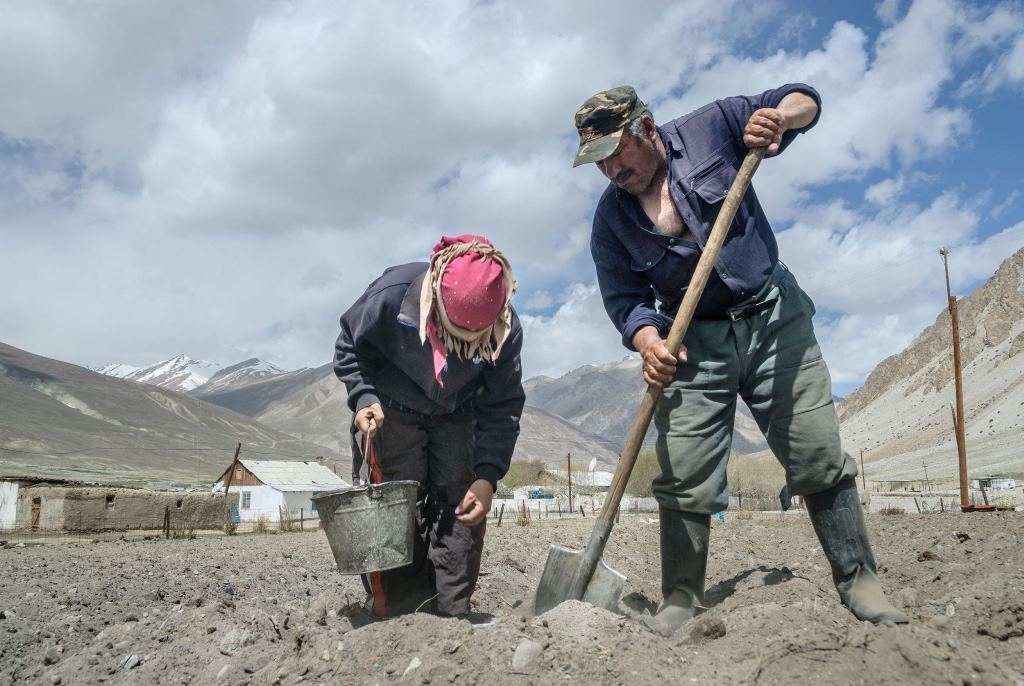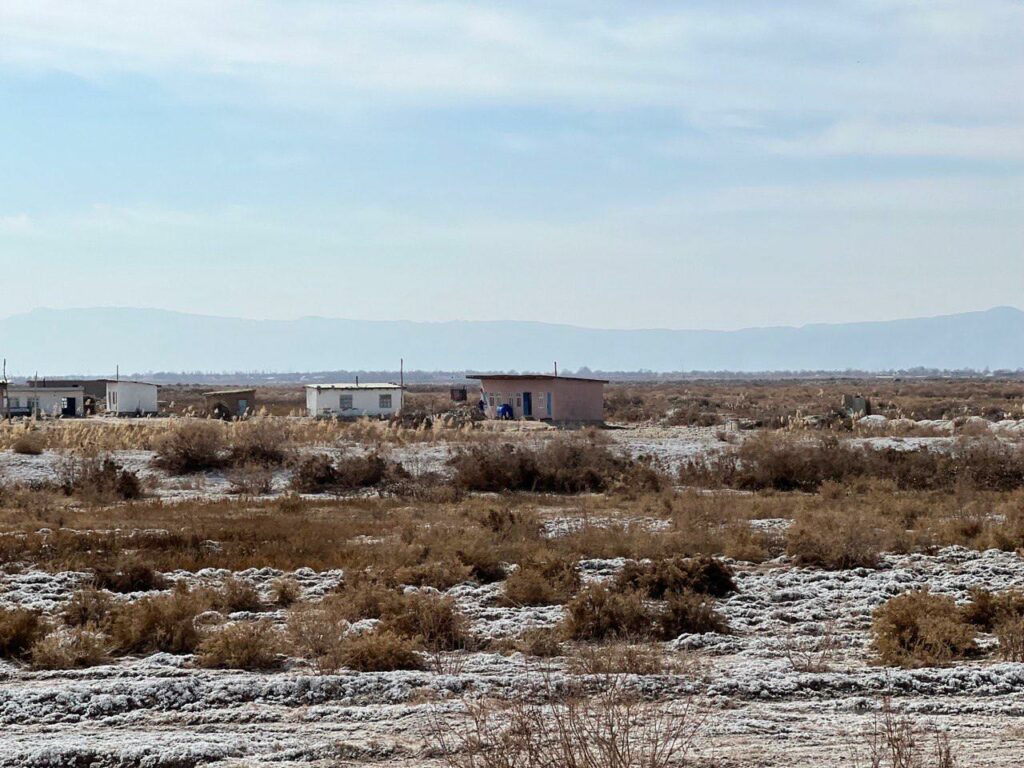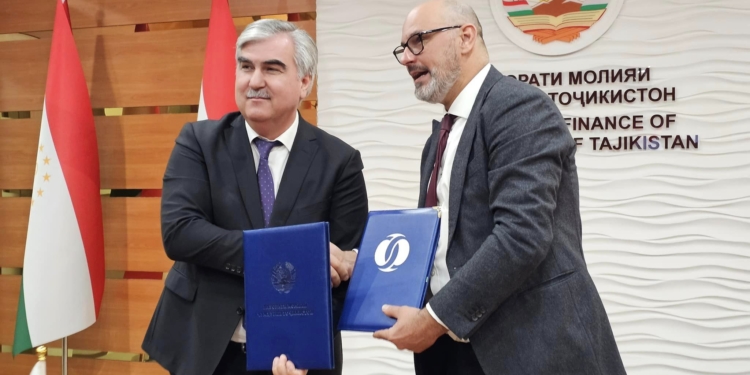llegal waste collection in Tajikistan not only violates the law but also threatens public health and the environment. Experts say that urgent measures are required to stop the growth of the illegal waste collection and recycling market.

“A Good Work Is Work for Yourself”
Rajab Mahmadov (not his real name) is one of those people who collect plastic bottles from the outdoor trash cans in Asadullo Gulomov Street in Dushanbe daily. First, he takes them home on a self-made trolley and then, sorts them as he sees fit.
He leaves the newer and cleaner cans and bottles for sale to those who sell drinks and water, and brings the rest of the containers, the dirtier or damaged ones, for recycling.
Mahmadov said that until a few months ago, he was officially employed by one of the structures of the Housing and Utilities Service in his district and was responsible for cleaning the dumpsite, but after the management changed, he left his job and started collecting plastic containers.
“The previous manager paid us about 1,000 somoni (about $90-100) to keep one dump clean. The new manager paid me the same amount to keep three dumps clean. I refused and started my own business,” Mahmadov said.
Now, Mahmadov sells one plastic bottle for between fifty dirams and one somoni (about 5 to 10 US cents) to beverage sellers. He also brings the dirty, damaged plastic containers to a recycling company for 1 to 1.3 somoni (10 to 12 US cents) per kilogramme.
“I sell plastic bottles to beverage sellers in the surrounding districts of the city. There are many of them, not just one person. And the dirty and damaged plastic containers are picked up from my house by people like me who have a car and more experience in this field. Sometimes, I take them myself to the ‘Polytechnical’ neighbourhood and hand them over,” says Rajab.
This way, he earns a certain amount of money. Although he refuses to specify the amount of his daily earnings, he believes that his labour benefits society. He is not aware that this type of activity is illegal.
“It Is Better Than Begging for Money!”
Gulchehra Khasanova (not her real name) also collects trash from trash cans in the central streets of the capital and sells it. She collects not only plastic containers but also waste paper and cardboard boxes. Her little son helps her with this work.
“I do not have an official job, and I am divorced. However, I must feed, educate, and raise this boy. All this requires money. Because of this, I collect plastic containers and wastepaper, hand them in at the waste collection point and earn up to 30-40 somoni (about $3-4) every day,” Gulchehra Khasanova said.
She emphasises that no one has ever criticised her for this work, on the contrary, generous people sometimes support her financially.
“I do not beg for money, I do not steal, I do not do anything illegal. I work and live my life. Sometimes, meeting me and my son on the streets, friendly people give us some money. However, in any case, if I find a good job with a decent salary, I will definitely give up this activity. Currently, there is no such opportunity. Anything is better than begging for money,” Khasanova said.
Just like Rajab Mahmadov and Gulchehra Khasanova, hundreds of other people are involved in trash collection and selling in the capital. Their exact number is unknown. The authorities also do not provide specific statistics on this issue.
Most of them work according to one plan: they collect all sorts of utensils, paper, iron, rubber from the capital’s trash dumps, take them to recycling companies, and receive some money for it. This is how they earn their living. They do not think about the legal framework of their activities.
“We Know About It but We Turn a Blind Eye to It”
Representatives of the Committee for Environmental Protection of Tajikistan, the body responsible for controlling dumpsites, admit that they are aware of residents’ unauthorised trash collection and sale activities.
This is illegal and contradicts the Code on Administrative Offences of Tajikistan. However, to ensure the work of waste recycling companies and considering the poor financial situation of the population, the lack of jobs, and the fact that this is the only source of income for many residents, in most cases, they turn a blind eye to this.
Ibodullohi Makhmadullo, head of the Department of State Control over the Use and Protection of Land and Waste Management of the Committee for Environmental Protection, said that residents have no right to collect trash from the dumpsites and, in general, people are not allowed to approach the dumpsites (except when they dispose of waste).
“Only a special vehicle can drive in, empty the trash cans, and fill the area with sand where necessary,” notes Ibodullohi Makhmadullo.
Tajikistan’s legislation does not provide specific criteria for illegal trash collection by residents, but, according to Article 232 of the Code on Administrative Offences of Tajikistan, a fine of one to three indicators for calculations (one indicator for calculations for 2024 in Tajikistan is 72 somoni or $6.7) is established for non-compliance with environmental protection requirements in transporting and using trash.
Ibodullohi Makhmadullo says that in the six months of 2024, about 30 people have been held administratively liable for collecting and taking out trash from the dumpsites.
“Most of them were identified and held liable because of the surveillance cameras installed by the Committee for Environmental Protection at the dumpsites,” he emphasises.
Ibodullohi Makhmadullo believes that the penalty for illegal trash collection is minimal and should be increased.
The surveillance cameras installed by the Committee also do not allow for full control of Dushanbe’s dumpsites. According to the Committee, cameras are currently installed in only 50 dumps in the capital. However, according to the Committee, the total number of dumps in Dushanbe reaches 1,805. Thus, only about 2.7% of all dumpsites in the city are under surveillance.
That is why in the first half of 2024, only 30 people were held liable for illegal trash collection, which is not enough to prevent this problem. Now, hundreds of people are doing it on the streets of the capital, and one can see them even on the central avenues and streets of Dushanbe.

According to Ibodullohi Makhmadullo, the authorities have abandoned strict controls to prevent cases of illegal trash collection because of the dire financial situation of the people, the lack of jobs, and the fact that this is the only source of income for some residents.
Another reason is the systematic supply of waste to recycling companies. Ibodullohi Makhmadullo says that these enterprises need materials for recycling, and these residents supply them with some of such materials.
“Although it is illegal for residents to collect and supply trash to recycling plants, we turn a blind eye to it for the development of these enterprises,’ Ibodullohi Makhmadullo said.
In Tajikistan, a special state enterprise – the Housing and Utilities Service – handles waste collection. It transports waste from the city dumpsites to large landfills outside the city.
The recycling plants in the country are mostly private, and they accept trash from individuals for recycling.
Waste recycling enterprises, which are legal entities, are fined from two hundred to three hundred indicators for calculations (from 14,000 to 21,600 somoni or $1,284 to $1,980) for non-compliance with environmental requirements for storage, transportation, and use of waste according to Article 239 of the Code on Administrative Offences.
How Legitimate Are the Recycling Companies’ Activities?
According to the Environmental Protection Committee, there are currently 74 small waste recycling enterprises operating across the country:
Ibodullohi Makhmadullo emphasised that all these enterprises are operating legally, but it is impossible to check everything. We managed to visit several waste recycling plants in the capital: one near the former ‘Jal-Jam’ market, one in the 46th microdistrict, one near Firdousi Park, and one in the microdistrict known as ‘Polytechnical’. We verified that all these plants accept trash from city residents, but all employees at these plants refrained from open dialogue and from providing documents confirming their legal activities.
The experts also believe that some waste recycling companies operate illegally.
An eco-activist Anisa Abibulloeva believes that some of these enterprises operate unofficially and stresses that the main reason for this is to avoid the additional costs of obtaining licences from the Ministry of Industry and New Technologies and the Committee for Environmental Protection.
To obtain a licence for waste recycling in Tajikistan, the enterprise must be registered with the Tax Committee, in addition, many other permits must be obtained: for fire safety – from the Fire Service, for production activities – from the Ministry of Industry and New Technologies, for the release of waste and pollutants into the atmosphere – from the Committee for Environmental Protection.
Another issue that Anisa Abibulloeva draws attention to is that in most cases, such enterprises cannot compete with the wide waste collection and recycling market due to the lack of investment and professionals in the industry, therefore they prefer to work unofficially. This further contributes to the growth of the illegal trash collection market.
What Is Produced and Where Does It All Go?

Ibodullohi Makhmadullo says that waste processing companies are mainly involved in recycling. For example, plastic is used to produce plastic containers or polyethene bags, paper is often used to make toilet paper, and petroleum products are used to make tyres, sports field surfaces, and rubber products.
According to the Environmental Protection Committee, the country recycles just over 23,000 tonnes of waste annually. The total volume of waste is 4 million cubic metres.
It is not possible to estimate the exact amount of capital flows in this sector.
According to Ibodullohi Makhmadullo, the products produced by these enterprises are used for economic activities within the country and are not exported abroad.
However, an employee at a waste-processing plant in the capital’s 46th microdistrict anonymously said they export recycled plastic containers to Uzbekistan, where they are used to make plastic bags.
Why Do State-Owned Facilities Not Recycle Waste?
In 2021, the Dushanbe Mayor’s Office announced the project ‘Solid Waste Management System’. This project was to be implemented by the State Unitary Enterprise ‘Shahri Khushmand’, which was also supposed to recycle waste, but the project was never implemented. The reason is still unknown.
Thus, the state system of waste recycling has not yet been formed in the country. Therefore, waste collection and processing are carried out by private waste recycling enterprises, without observing legal norms and by using private individuals’ services.
The experts attribute the reasons for the involvement of individual residents in waste collection and recycling to the weak waste management strategy of local authorities.
In particular, Anisa Abibulloeva says that the poor waste management strategy of local authorities leads to uncontrolled transportation of waste from dumpsites, “trash cans are always full, and this makes trash easily accessible to the population”.
This situation is also connected with the fact that the labour force in Tajikistan is growing rapidly, and jobs are hard to find. In conditions of unemployment, some residents earn money for their living by collecting and selling trash.
Ibodullohi Makhmadullo also recognises the inadequacies of the government’s strategy on recycling.
“There is no specific waste management strategy yet. There are plans to adopt one in the future, and the Committee is developing this strategy,” says Ibodullohi Makhmadullo.
However, it is unknown when this strategy will be developed and adopted, and authorities do not provide specific information on this matter.
Meanwhile, the legislation of the country establishes the procedure for the collection, storage, transportation, disinfection, as well as cleaning of residential areas. Article 11 of the Law of the Republic of Tajikistan “On Production and Consumption Waste” assigns this responsibility exclusively to local authorities and emphasises that in its implementation it is necessary to comply with the requirements of sanitary, hygienic, and environmental norms and standards.
The main law on waste management is the Law of the Republic of Tajikistan “On Production and Consumption Waste” (updated on 28.06.2011, №736). The main acts on municipal solid waste are set in Article 4 “Main principles of state policy in the field of waste management”.
According to the Law of the Republic of Tajikistan “On Production and Consumption Waste”, ownership of waste remains with its owner until the waste is transferred to specialised bodies or disposed of in the prescribed procedure (Article 4.1). Once waste is collected by the bodies authorised to process it, its ownership is transferred to these bodies, including local executive authorities (Article 6).
The organisation of waste collection and disposal is regulated by approved sanitary and environmental norms (Article 11). Unauthorised waste collection and disposal by residents, for example, in unauthorised places, may be considered as a violation of the established waste management rules. This is due to the obligation of all citizens to comply with the current legal requirements in this area (Article 22).
Thus, any actions with waste contrary to the established norms may be qualified as a violation of the waste management procedure.
The Law of the Republic of Tajikistan “On Environmental Protection” and the Government Decree “On the Procedure of Waste Disposal and Transportation” are also in force. Responsibility for their implementation is also assigned to the Committee for Environmental Protection, the State Enterprise ‘Housing and Utilities Service’ and the Sanitary and Epidemiological Surveillance Service of the Republic of Tajikistan.
The absence of a state strategy for waste collection, transportation, and recycling in Tajikistan, as well as insufficient regulation of the waste recycling process in the country’s legislative documents, have become a favourable basis for the development of illegal waste collection and recycling involving private individuals.
Prevention of Illegal Waste Collection
Anisa Abibulloeva considers the state’s role in preventing illegal waste collection and recycling as very important. First, it is necessary to create an effective system of waste collection and recycling.
According to Anisa Abibulloeva, the government can regulate this sector and has various means to do so, such as providing soft loans, direct investment, creating favourable conditions for official activities, facilitating access to licences, and increasing producers’ responsibility.
“One of the advanced methods to regulate waste management is to specify the composition of waste and start its centralised recycling. That is, if the composition of waste is specified and it is processed centrally at large waste recycling plants, in this case, more recycled products can be produced,” says Anisa Abibulloeva.
Another way she sees is cooperation and partnership between the state and the private sector. Abibulloeva says that in this case, the state signs a cooperation agreement with the private sector, and local authorities create conditions for the private sector to operate so that the population can also work in favourable conditions. In this case, the waste recycling enterprises would be encouraged to operate legally.
Finally, the population should also be informed about the waste collection and recycling procedures, their legal basis, sanitary requirements, and receive adequate payments.
“If urgent measures are not taken, the number of residents engaged in illegal waste collection and recycling will grow, and the waste recycling sector will not develop,” Anisa Abibulloeva predicts.
https://cabar.asia/en/illegal-waste-collection-and-recycling-in-dushanbe-who-is-responsible-and-why-do-the-authorities-not-prevent-it



